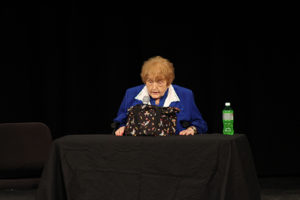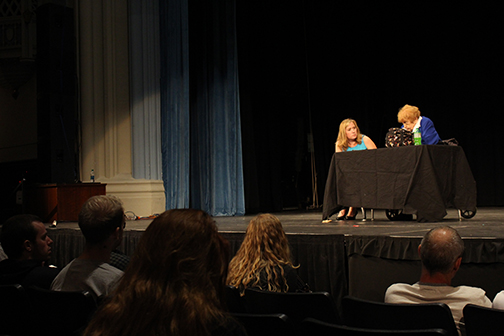By DENISE ELAM
Features Editor
(WARRENSBURG, Mo., digitalBURG) — Holocaust survivor Eva Kor spoke about forgiveness and overcoming prejudice to UCM students in a presentation Friday, Oct. 28, in Hendricks Hall.

PHOTO BY DENISE ELAM / FEATURES EDITOR
Eva Kor speaks at Hendricks Hall to UCM students and faculty.
Kor was just 10 years old when she was sent to Auschwitz with her family.
“It was the most confusing place I have ever been to,” Kor said. “In my childish curiosity, I looked around trying to figure out ‘What on earth is this place?’ And as I looked around, I realized that my father and my two older sisters disappeared in the crowd. I tried to search for them but I never saw them again.”
Kor said she and her sister, Miriam, were separated from their mother when a Nazi noticed they were twins.
“He demanded to know from my mother if we were twins. And my mother asked ‘Is that good?’ The Nazi nodded yes. And my mother said ‘Yes,’” Kor said. “At that moment another Nazi came (and) pulled my mother to the right. We were pulled to the left. We were crying, she was crying, and all I really remember is seeing her arms stretched out in despair as she was pulled away. I never even got to say goodbye to her. But I didn’t really understand that that would be the last time that we would see her.”
Kor said she and her sister became part of a group of 13 sets of twin girls between the ages of 2 and 16. They were lined up for registration where they were given short haircuts and dresses with a red cross on the back. Kor said she later learned the cross meant she would become part of medical experimentation. After being tattooed with an identification number, Kor said they were taken to their barracks. The barracks were crude and infested with mice.
“I counted them. When I got to five, I jumped up screaming, ‘Mice! Mice! These are big mice!’” Kor said. “A girl from the top bunk said ‘Silly kid, these are not mice. They’re rats and you better get used to them because they are everywhere.’ And they were.”
Kor said her bunk was close to the floor and the rats, so she and her sister got up to use the latrine.
“As we entered the place, there on the filthy latrine floor was the scattered corpses of three children,” Kor said. “It became clear to me that in this place children were dying. And right then and there I made a silent pledge that I would do anything and everything within my power to make sure that Miriam and I should not end up on the filthy latrine floor. I had an image of my mind how Miriam and I might look as we walk out of this camp alive.”
Kor and the other twins were used in medical experiments by Dr. Josef Mengele.
“I was used in two types of experiments,” Kor said. “On Monday, Wednesday and Friday… we would be taken to a lab, (and) placed naked in a room for up to eight hours. They would measure in the most minute detail every part of my body. Then they (would) compare it to Miriam. Then they (would) compare it to charts.”
Kor said that type of experimentation wasn’t dangerous, but it was very demeaning.
“On other days, Tuesday, Thursday and Saturday, we would be taken to another lab that I call the blood lab,” Kor said. “There, they would tie both of my arms to restrict the blood flow, take a lot of blood from my left arm, (and) give me a minimum of five injections into my right arm at the same time. Those were the deadly ones. We had no idea what they were then, nor do I know today.”
Kor said Mengele used 1,500 sets of twins. Only 200 were estimated to have survived. Kor became sick after one of the injections and was taken to the hospital. She had a high fever, swollen arms and legs and huge red spots on her body. Mengele looked at her charts and laughed.
“Too bad,” he said. “She is so young. She has only two weeks to live.”
Kor said she refused to die. She made a second silent pledge to prove Mengele wrong and be reunited with her sister. After two weeks, her fever broke. Three weeks after her charts returned to normal, she was reunited with Miriam.
Kor said one day an airplane appeared over the skies of Auschwitz. It was flying low enough for her to see the American flag under one of the wings. She said it gave her hope that someone was trying to save them.
“The Nazis disappeared (the) beginning of January and we were on our own. The fighting was still going on. They were still fighting against the allies that were advancing.”
Kor said it was eerily quiet one morning when she woke up. She went outside with Miriam to learn more about what was happening.
“At the distance, I saw lots of people and they were all wrapped in white camouflage raincoats. They were smiling from ear to ear,” Kor said. “I had no idea who they were but that was not important. One thing was important; That they didn’t look like the Nazis.”
Kor said they ran up to the soldiers, who gave them chocolates, cookies and hugs.
“That was my first feeling of freedom. Miriam and I were alive. We had triumphed over unbelievable evil, and the glory of that day will be forever engraved in my heart,” Kor said.
Kor’s presentation at UCM marked the 140th time this year she has presented to a crowd. She said wants to speak to young people to share the life lessons she has learned. She gave the crowd three pieces of advice: never give up on their dreams, judge people by their character in order to avoid prejudice, and forgive others who have wronged them.
“I have forgiven the Nazis. I have forgiven everybody,” Kor said. “Forgiveness, in my opinion, is nothing more or nothing less than an act of self-healing, self-liberation and self-involvement.”
Kor said she believes anger is a seed for war.
“People who forgive are at peace with themselves and the world, therefore I call forgiveness a seed for peace,” Kor said. “I believe that in every group – or even there are some people here who are angry and dealing with the problem of forgiveness – (to) do it or not do it? I ask you all to do it.”



Leave a Reply